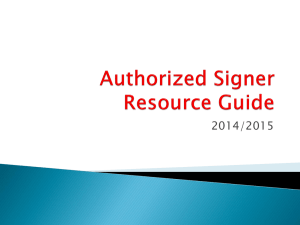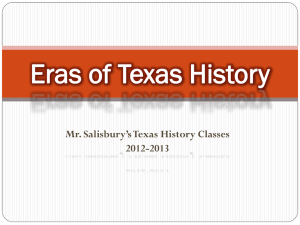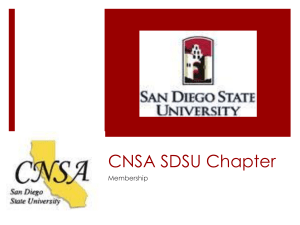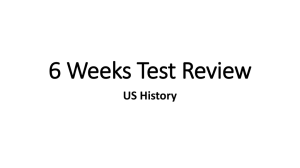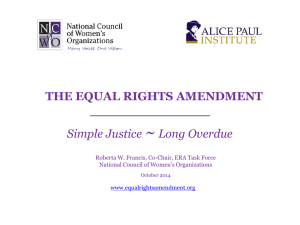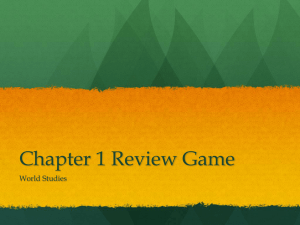MTTC Social Studies Review at CMU
advertisement
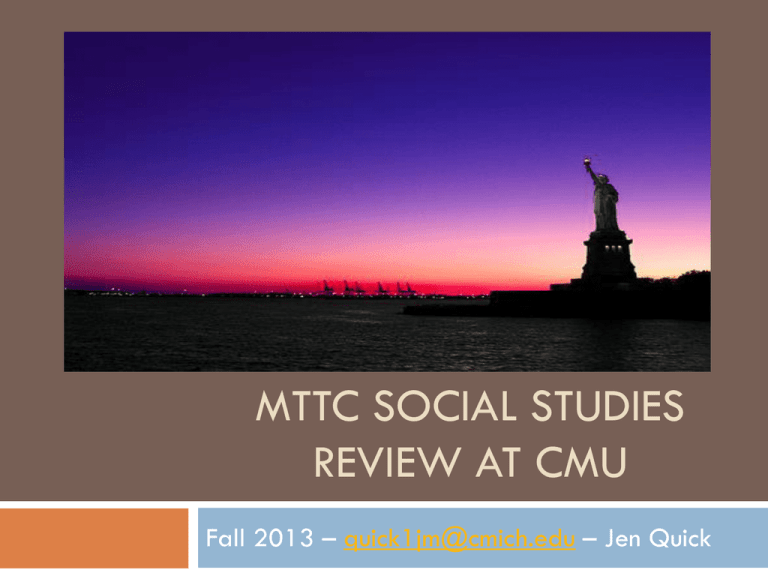
MTTC SOCIAL STUDIES REVIEW AT CMU Fall 2013 – quick1jm@cmich.edu – Jen Quick How should I prepare for a test that I spent the last 16 years studying for? One question at a time! Don’t rush, carefully read. Don’t Freeze, Keep Going! Use your time well, and keep moving. If you are stumped, circle the number and move to the next question. Go back to what you have circled once you have what you know, done. Use the “Process of Elimination.” You are NOT penalized for guessing on the MTTC. You have a one in four chance of being correct. Cross off the answers you know are incorrect and then choose the most logical answer, this improves your “odds.” jmq.CMU.MTTC Review When in doubt choose “C.” Most EFFECTIVE/ENGAGING Study Strategies Reread notes, or textbook …………………. No Do practice problems, or questions ………… Yes Make flashcards for practice ………………. Yes Study in groups where explanations are being made about Social Studies information …..….Yes Mnemonics, any learning technique that aids information retention ………………………..Yes Real Life examples …………………………. Yes jmq.CMU.MTTC Review What is covered on the Social Studies MTTC test? Geography…………………………………... 27% United States (U.S.)/Michigan History ………. 18% Political Science (Government) ……………… 14% World History ………………………………. 14% Inquiry, Interdisciplinary Perspective, Public Discourse ……………………………………. 14% Economics ………………………………….... 13% jmq.CMU.MTTC Review Geographic Topics/Terms Covered on MTTC Coral Reef Mountains Human Interaction Environmental Adaptations Interpretation of Past Geographic events Natural Hazards Hills Marsh Spatial Organization Interpretation of Present Geographic events Plains Foothills Swamp Oceans Geomorphology - Deserts Valley Tundra Seas Humid Continental Climate Delta Plateau Taiga Lakes Prairie Climate Basin Mesa Canals Rivers Subtropical Climate Maps Time Zones Commodities Natural Resources Marine Climate Map Making Renewable Resource Physical Geography Uses of Geography Cultural Geography Nonrenewable Resources jmq.CMU.MTTC Review 5 Themes of Geography (Mr. Help) jmq.CMU.MTTC Review Landforms and Bodies of Water jmq.CMU.MTTC Review Map Projection jmq.CMU.MTTC Review Latitude and Longitude jmq.CMU.MTTC Review Time Zones jmq.CMU.MTTC Review Biomes of the World jmq.CMU.MTTC Review Climate Zones jmq.CMU.MTTC Review History, Geography and Time http://worldhistoryforusall.sdsu.edu/getting_started.php This program will help you work through the Geographic parts of the MTTC test. You are able to test yourself and what you have learned by completing the Activity PDF Pages at the end of each section. jmq.CMU.MTTC Review WORLD HISTORY jmq.CMU.MTTC Review World History for US ALL! Nine Big Eras At the high end of the scale, World History for Us All introduces eleven primary categories of study. The first is an introduction titled "History, Geography, and Time." The next nine are titled Big Eras. The final one is called "Reflecting on the Past, Thinking about the Future." All nine Big Eras address history on the scale of humankind. That is, they are not limited to a particular region or civilization. Each Big Era deals with a chronological period on the global scale. Each successive period is shorter than the previous one. For example, Big Era One considers the very long epoch of history up to the emergence of homo sapiens. Big Era Nine is concerned with second half of the twentieth century and the dawn of the twenty-first. Study of all nine eras is supported by Big Era teaching units designed for exploring the past on several scales of time, space, and subject matter. jmq.CMU.MTTC Review Big Era One: Panorama Unit http://worldhistoryforusall.sdsu.edu/eras/era1.php The lessons in this panorama unit highlight three issues that establish the context in which human history has taken place: Lesson 1 explores the scales of time in which the evolution of our universe, the earth within that universe, and humans on that earth has occurred. Through kinesthetic exercises, students compare the scale of such changes with scales of time to which they can relate from their own experiences. The purpose of the lesson is to develop students’ “chronological literacy.” Lesson Two examines how humans fit into the biological realm by distinguishing the physical characteristics that make us different from any other organism. Lesson Three further establishes our distinctive nature in terms of the cultural characteristics, notably language, that define us as uniquely human. This lesson sets the stage for Big Era Two, in which students explore how humans development of symbolic language led to the immense cultural changes that make up our history. jmq.CMU.MTTC Review Era’s 2-9 of World History http://worldhistoryforusall.sdsu.edu/eras/era2.php http://worldhistoryforusall.sdsu.edu/eras/era3.php http://worldhistoryforusall.sdsu.edu/eras/era4.php http://worldhistoryforusall.sdsu.edu/eras/era5.php http://worldhistoryforusall.sdsu.edu/eras/era6.php http://worldhistoryforusall.sdsu.edu/eras/era7.php http://worldhistoryforusall.sdsu.edu/eras/era8.php http://worldhistoryforusall.sdsu.edu/eras/era9.php jmq.CMU.MTTC Review Six Basic Principles of the U.S. Constitution jmq.CMU.MTTC Review Amending the U.S. Constitution jmq.CMU.MTTC Review Bill of Rights for U.S. Citizens jmq.CMU.MTTC Review U.S. Structure of Government (Federal Government and Most State Governments) jmq.CMU.MTTC Review Classic Forms of Government jmq.CMU.MTTC Review Forms of Governments around the World jmq.CMU.MTTC Review U.S. HISTORY U.S. History.org American History – Our Nation from beginning to today. From Pre-Columbian to the New Millennium The word history comes from the Greek word historía which means "to learn or know by inquiry." In the pieces that follow, we encourage you to probe, dispute, dig deeper — inquire. History is not static. It's fluid. It changes and grows and becomes richer and more complex when any individual interacts with it. Knowledge of history is empowering. An event is but the furthest ripple of an ever-expanding wave that may have started eddying outward hundreds of years ago. One who "sees" history is able to harness the power of that wave's entire journey. Finally, the best history has at its foundation a story. A printer challenges a King and so is laid the foundation of the first amendment; a New Jersey miner finds gold in California and sets off a torrent of movement westward; a woman going home from work does not relinquish her seat and a Civil Rights movement explodes. These stories all help to ask the question, "What is an American?" You'll help to answer that question as you read through the clear and easy to read sections. jmq.CMU.MTTC Review U.S. History.org http://www.ushistory.org/us/index.asp Like the World History Section, this section is all found online at the ushistory.org website. Read the questions prior to reading the section. Read the section and if necessary, take notes. Go back to the questions and see what you are able to answer from having read the section. Keep up the routine until you have read through the New Millennium Section. jmq.CMU.MTTC Review INQUIRY, PERSPECTIVE, DISCOURSE It is very important that you are able to reason and logically look at both sides of a debate. You must teach your students how to build arguments. jmq.CMU.MTTC Review How Teacher’s Foster Great Debate! jmq.CMU.MTTC Review Essential Questions of Inquiry jmq.CMU.MTTC Review Make the story of our world come alive for your students and yourself!!! jmq.CMU.MTTC Review ECONOMICS As the first Secretary of the Treasury, Alexander Hamilton set the economic course for the U.S. jmq.CMU.MTTC Review Economic Systems jmq.CMU.MTTC Review Market Economy – Supply and Demand jmq.CMU.MTTC Review Free Markets jmq.CMU.MTTC Review Causes of Economic Downturns High Debt Load – Personal and Governmental Downturn in World Markets Unclear Monetary Policy Stock Market Panic and Collapse Political Problems Economic Collapse Industry Overproduction Industrial Crisis Problems in Wealth Distribution jmq.CMU.MTTC Review Farming – Overproduction or Underproduction ECON 101 jmq.CMU.MTTC Review Additional Materials http://www.testprepreview.com/mttc-social-studies.htm MTTC Social Studies Practice Tests http://www.cram.com/flashcards/types-of-geographicfeatures-359946 Geography Flash Cards http://www.teacheroz.com/generalUS.htm - General U.S. History Information and Websites http://www2.webster.edu/~woolflm/statmethods.html Research Methods Ushistory.org jmq.CMU.MTTC Review
